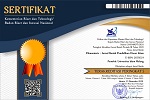FILSAFAT MENGAJARI MANUSIA BERPIKIR KRITIS
DOI:
https://doi.org/10.33474/elementeris.v1i2.4970Abstract
Humans as thinking, of course in thinking can not be separated from the activities of thinking. Critical thinking or critical thinking is something that everyone must have. With critical thinking a person will not slip into the abyss of negativity, and falsehood because critical thinking is positive thinking to achieve the product of truth and clarity. Critical thinking is essentially not the monopoly of adults, madrasa or school children also have room for critical thinking even though the level of criticality is different from adults. Philosophy teaches humans to think critically and even deeply. Cogito Descartes is one method used to teach someone to think critically, starting from a doubt to a certainty.
References
Ali, Muhammad dan Muhammad Asrori. (2012). Psikologi Remaja: Perkembangan Peserta Didik. Jakarta: Bina Aksara.
Alwasilah, A. Chaedar. (2008). Filsafat Bahasa dan Pendidikan. Bandung: Remaja Rosdakarya
Bertens, K. (2011). Ringkasan Sejarah Filsafat. Yogyakarta: Kanisius
Depdiknas. (2011). Kamus Besar Bahasa Indonesia Pusat Bahasa. Jakarta: Gramedia Pustaka Utama.
Kaelan. (2016). Pendidikan Pancasila. Yogyakarta: Paradigma.
Nasution, Harun. (1978). Falsafat dan Mistisime dalam Islam. Jakarta: Bulan Bintang.
Poedjawiyatna, IR. (1990). Pembimbing ke Arah Alam Filsafat. Jakarta: Rineka Cipta
Prawira, Purwa Atmaja. (2012). Psikiologi Pendidikan dalam Perspektif Baru. Jogjakarta: Ar-Ruzz Media.
Sadulloh, Uyoh. (2007). Pengantar Filsafat Pendidikan. Bandung: Alfabeta
Tafsir, Ahmad. (2008). Filsafat Umum: Akal dan Hati Sejak Thales Sampai Capra. Bandung: Remaja Rosdakarya
Downloads
Published
Issue
Section
License
The journal operates an Open Access policy under a Creative Commons Non-Commercial 4.0 International license. Authors who publish with this journal agree to the following terms:
- Authors retain copyright and grant the journal right of first publication with the work simultaneously licensed under a Commons Attribution-NonCommercial 4.0 International License
that allows others to share — copy and redistribute the material in any medium or format, and adapt — remix, transform, and build upon the material.
- Authors are able to enter into separate, additional contractual arrangements for the non-exclusive distribution of the journal's published version of the work (e.g., post it to an institutional repository or publish it in a book), with an acknowledgement of its initial publication in this journal.
- Authors are permitted and encouraged to post their work online (e.g., in institutional repositories or on their website) prior to and during the submission process, as it can lead to productive exchanges, as well as earlier and greater citation of published work.
Elementeris: Jurnal Ilmiah Pendidikan Dasar Islam by Universitas Islam Malang is licensed under a Creative Commons Attribution-NonCommercial 4.0 International License.
Based on a work at http://riset.unisma.ac.id/index.php/je/index.















